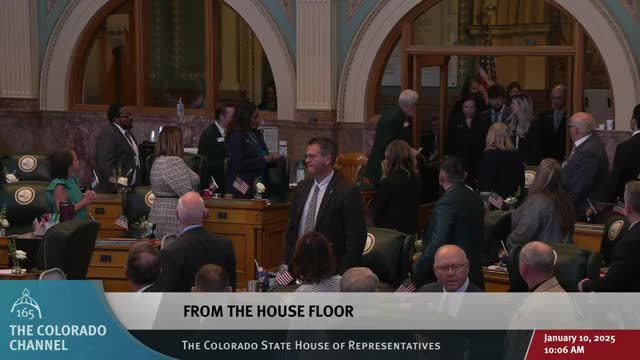Colorado chief justice urges funding for more judges and a secure digital courtroom
Get AI-powered insights, summaries, and transcripts
Subscribe
Summary
Chief Justice Monica M. Marquez told a joint session of the Colorado General Assembly that rising caseloads, virtual-courtroom disruptions and security threats mean the judiciary needs more judges, improved physical security and a purpose-built digital courtroom platform.
Chief Justice Monica M. Marquez of the Colorado Supreme Court told a joint session of the General Assembly on Jan. 10, 2025, that the state’s courts need additional judges and a secure, purpose-built digital courtroom platform to address rising workloads and frequent virtual-courtroom disruptions. She also asked lawmakers for help improving physical security for judges and court staff.
Marquez said the judicial branch employs about 4,000 people, including roughly 400 judges and magistrates, handles well over half a million cases each year, and supervises about 65,000 people on probation. “The most precious resource we have is our time. Time to properly handle all the cases that come our way,” she told members of the Colorado House of Representatives and the Senate in the joint session.
The chief justice said recent years have brought two security risks that amplify the courts’ strains: physical attacks and coordinated disruptions of virtual hearings. She listed incidents including a fatal shooting outside the Colorado Springs courthouse, an intruder who shot into the Ralph Carr building and set a fire, a defendant’s suicide at the Lindsay Flanagan courthouse in Denver, a bomb threat in Alamosa, and repeated death threats against judges across the state. She also described “virtual courtroom disruptors” who join hearings to hurl abuse or stream explicit material, calling the need for a dedicated digital courtroom “a fundamental question of public safety.”
Marquez thanked the Joint Budget Committee for authorizing emergency funding to issue a request for proposals for a digital-courtroom solution and said the judiciary will be asking the legislature this session for additional resources to improve physical security.
On judicial staffing, Marquez said she supports a targeted, partial request for new judges rather than full staffing. She thanked senators Dylan Roberts and Lisa Frizzell for introducing Senate Bill 25024 as the branch’s request for new judges and said the measure is aimed at providing relief to districts facing the greatest need. “For judges and the jurisdictions targeted in the bill, the current situation is simply unsustainable,” Marquez said, describing judges routinely working nights and weekends and an ongoing decline in applicants for vacancies.
Marquez highlighted nonlegislative initiatives intended to relieve pressure on the courts and expand access: a licensed legal paraprofessionals program (LLPs) authorized last session to help litigants with relatively simple domestic relations matters, internship pipelines to recruit court interpreters, problem-solving courts that connect people to treatment in lieu of incarceration, statewide magistrate wellness efforts, and warrant-clearance events.
She said the branch has undergone rapid turnover — more than half of sitting judges were appointed in 2020 or later — and has launched a workplace-culture initiative and new statewide training committee to better prepare judges and staff. The chief justice said those investments seek to ensure timely, fair resolution of cases and to maintain public trust in Colorado’s courts.
The address concluded with a request for the legislature’s support. “Our ability to deliver timely justice to Colorado’s families and businesses is crucial to sustaining the public’s trust in our courts,” Marquez said.
